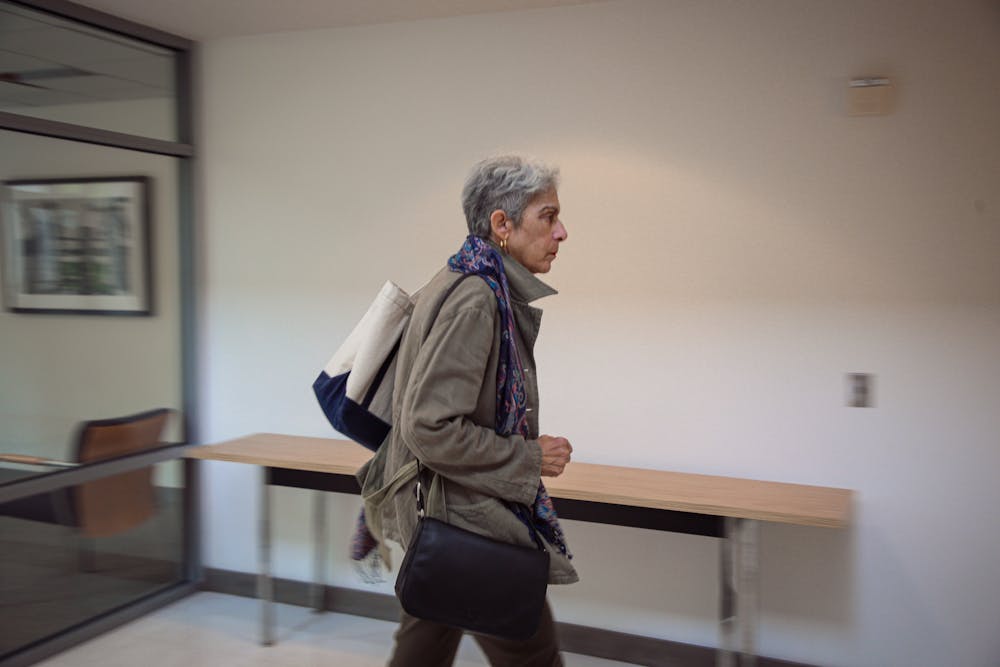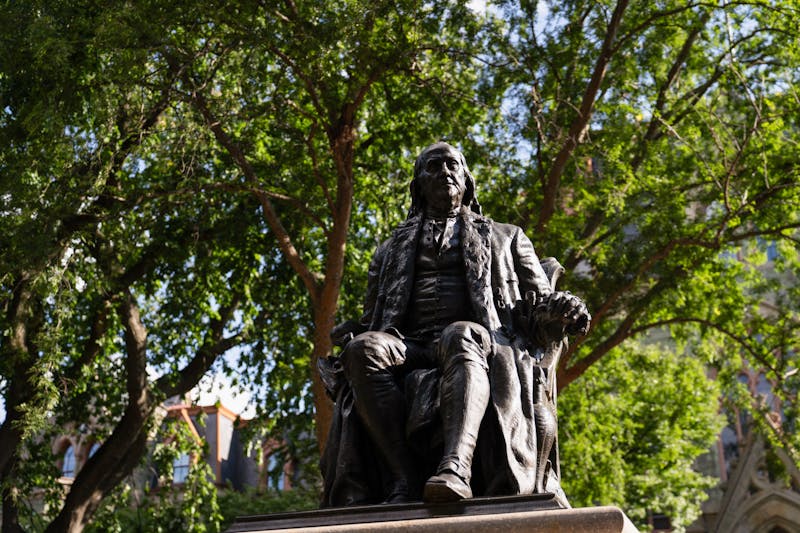
The Faculty Senate Committee on Academic Freedom and Responsibility upheld sanctions against Penn Law professor Amy Wax in a decision made public on Sept. 23.
Penn has upheld sanctions against University of Pennsylvania Carey Law School professor Amy Wax following her history of discriminatory remarks and two years of disciplinary proceedings with little precedent.
The new ruling, first reported by The Philadelphia Inquirer, comes after the Faculty Senate Committee on Academic Freedom and Responsibility upheld sanctions that were initially recommended by a Faculty Senate hearing board on June 21, 2023 and strikes down an appeal filed by Wax and her lawyer, David Shapiro, this past February.
“These findings are now final, following a determination by the Faculty Senate’s Committee on Academic Freedom and Responsibility that the proper process was followed,” a University spokesperson wrote in a statement to The Daily Pennsylvanian.
The sanctions mark the first time in recent history that a tenured University professor has been sanctioned through Faculty Senate procedures. Neither Wax nor her lawyer responded to requests for comment in time for the publishing of this article.
The DP previously reported that the recommended sanctions against Wax included a one-year suspension at half pay, the removal of her named chair and summer pay, and a requirement for Wax to note in public appearances that she is not speaking on behalf or as a member of Penn Carey Law.
Penn will announce the decision in Tuesday’s edition of the Penn Almanac. The decision will include a letter of reprimand from Provost John Jackson Jr.
“Academic freedom is and should be very broad. Teachers, however, must conduct themselves in a manner that conveys a willingness to assess all students fairly,” Jackson wrote in a copy of the letter obtained by the DP. “They may not engage in unprofessional conduct that creates an unequal educational environment.”
Interim Penn President Larry Jameson added that Wax must refrain from “flagrantly unprofessional and targeted disparagement of any individual or group in the University community … for so long as [she is] a member of the University’s standing faculty.”
In a June 2023 letter to former Penn President Liz Magill, the hearing board noted that they “do not dispute the protection” that Wax holds over her views, but said that the way she presents these views violate widely acknowledged “behavioral professional norms” when presented as “uncontroverted.”
The hearing board “unanimously” found that the facts presented throughout the hearing “constitute serious violations of University norms and policies,” according to the letter. The hearing board also concluded that Wax’s behavior “has created a hostile campus environment and a hostile learning atmosphere.”
When determining sanctions, the hearing board decided that the University should issue a public reprimand, but it did not suggest that Wax should be fired or stripped of tenure. Separate from the sanctions, the hearing board suggested that the University and Penn Carey Law should consider having Wax co-teach her classes with another faculty member, and that Wax teach her classes outside of Penn Carey Law buildings.
The board wrote that it found Wax “in dereliction of her scholarly responsibilities, especially as a teacher” in part due to her “reliance on misleading and partial information,” which results in her drawing “sweeping and unreliable conclusions.”
But the sanctions, which reportedly take effect for the 2025-26 school year, won’t have an impact on her teaching plans this semester — which, according to a course syllabus obtained by the DP, include an invite of American Renaissance magazine editor Jared Taylor to deliver a guest lecture at Dec. 3 meeting of LAW 9560: “Conservative and Political Legal Thought.” The invitation would mark at least the third appearance by Taylor at Wax’s class in four years, after his visit last fall sparked a protest outside Wax’s classroom and a rare schoolwide email from Penn Carey Law Dean Sophia Lee addressing the “bounds of academic freedom.”
Weeks before Taylor comes to campus, Wax is scheduled to speak at a conference in Tennessee alongside multiple people who have reportedly espoused white supremacist, neo-Nazi, and racist views.
Tuesday’s Almanac will also include an Aug. 11, 2023 letter from Magill in which she accepted the sanctions initially recommended by the hearing board.
Jameson provided an introduction for Magill’s letter, summarizing the disciplinary process against Wax and confirming he was implementing Magill’s decision.
Magill wrote in her letter that the board considered arguments such as the “critical point” regarding academic freedom and used a “well-developed” factual record to make its decision.
While she said she was “mindful of the limit of my authority as established by our policy,” Magill accepted the major sanctions suggested from the board’s report.
The letter from Magill prompted Wax to file a Aug. 29, 2023 appeal to SCAFR, in which Wax’s lawyer argued that there were “several procedural defects” which gave the respondent the right to appeal.
Shapiro wrote that that the most significant “defect” was that the hearing board made the decision “about the breadth and extent of a tenured professor’s contractually guaranteed right to academic freedom,” rather than SCAFR.
The appeal also alleged that Magill and the hearing board applied an unfair speech standard. Shapiro wrote that Wax was punished under an “incoherent standard, never before articulated, or applied to any Penn faculty member.”
The standard used to punish Wax has drawn scrutiny from the Foundation for Individual Rights and Expression, a national civil liberties group which said on Monday that Penn had mustered “zero evidence” that Wax discriminated against her students.
“Faculty nationwide may now pay a heavy price for Penn’s willingness to undercut academic freedom for all to get at this one professor,” FIRE Vice President Alex Morey wrote in a statement. “After today, any university under pressure to censor a controversial faculty member need only follow Penn’s playbook.”
Wax's history of discriminatory statements has included her claiming that Black students never graduate at the top of the Penn Carey Law class and that “non-Western groups” are resentful towards “Western people.” Wax has also faced criticism for hosting white nationalist Jared Taylor for a guest lecture and allegedly telling a Penn Carey Law student that she was only accepted into the Ivy League “because of affirmative action.”
In June 2022, former Penn Carey Law Dean Ted Ruger filed a complaint to the Faculty Senate recommending a “major sanction” against Wax. At the time, he cited numerous student and faculty accounts of Wax's conduct that he believed warranted disciplinary action. Ruger asked the Faculty Senate to appoint a hearing board of five professors from across the University to evaluate his complaint, conduct a full review of Wax's conduct, and impose sanctions in line with the University's policy for punishing tenured faculty members.
“Academic freedom for a tenured scholar is, and always has been, premised on a faculty member remaining fit to perform the minimal requirements of the job,” Ruger wrote in his report to the Faculty Senate. “However, Wax’s conduct demonstrates a ‘flagrant disregard of the standards, rules, or mission of the University.’”
The Daily Pennsylvanian is an independent, student-run newspaper. Please consider making a donation to support the coverage that shapes the University. Your generosity ensures a future of strong journalism at Penn.
Donate












